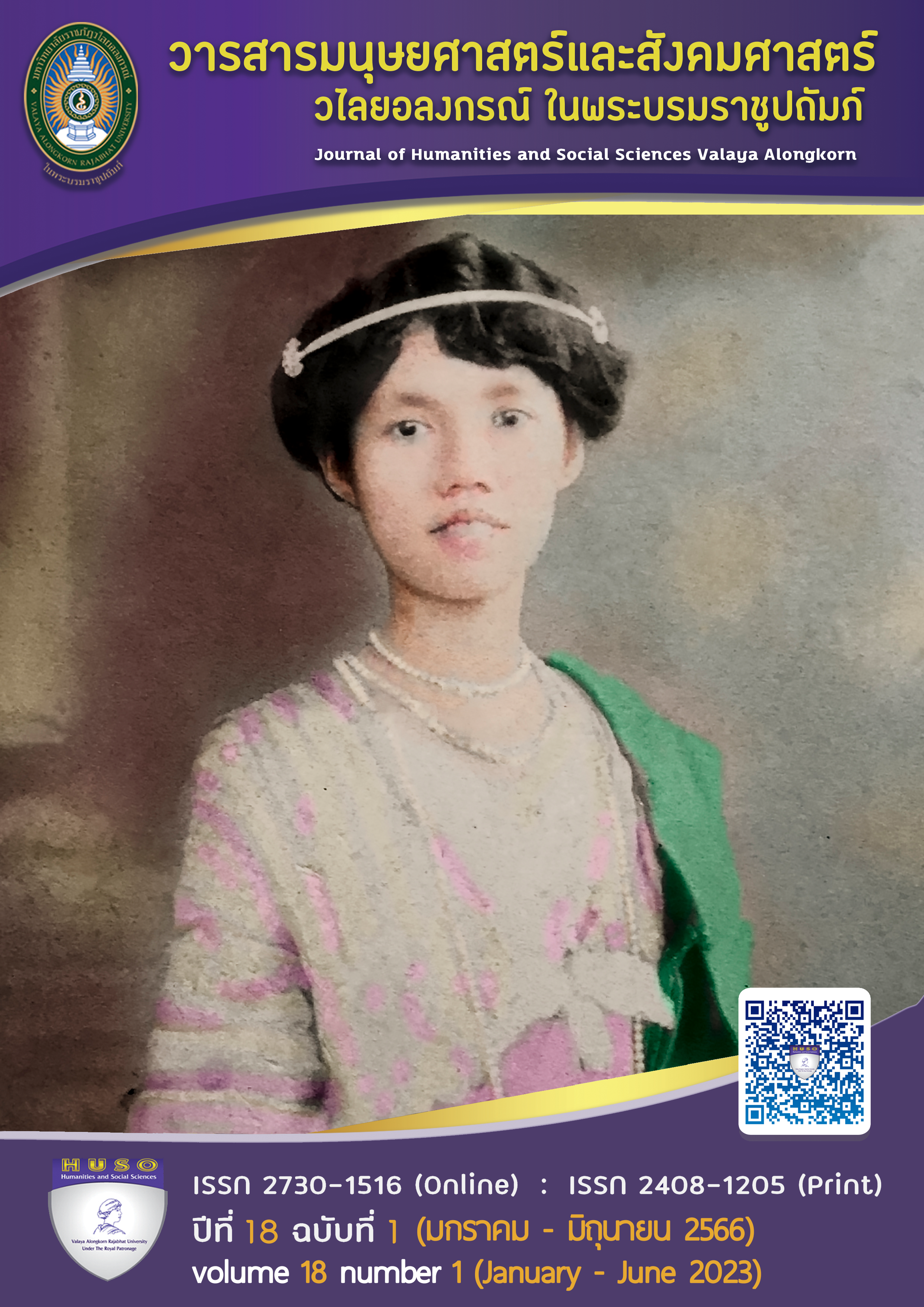A STUDY OF LEARNING EXPERIENCE PROVISION ON AN UNPLUGGED CODING MODEL OF EARLY CHILDHOOD TEACHERS TO ENHANCE EXECUTIVE FUNCTION FOR EARLY CHILDHOOD
Main Article Content
Abstract
The purposes of the current research were to; 1) To Study the opinions of early childhood teachers about UNPLUGGED CODING learning experience provision that enhance executive functions for early childhood. 2) To Compare the opinions of early childhood teachers about UNPLUGGED CODING learning experience provision of early childhood teachers classified by education level. And teaching experiences. The sample group used in this research is early childhood teachers under the Office of the Education Commission Pathum Thani Province, 120 people, was obtained by multi-stage random sampling. The instrument used in this research was the UNPLUGGED CODING learning experience provision questionnaire of early childhood teachers in Pathum Thani Province. Data were analyzed using descriptive statistics, including percentage, mean, and standard deviation. and the reference summary statistics, including the F – test. The results showed that
The teachers have the UNPLUGGED CODING learning experience provision of early childhood teachers that executive functions for early childhood. Overall, it was at a high level ( = 4.12, S.D. = 0.69). When categorized by aspect, Knowledge and understanding about the unplugged coding learning experience provision of early childhood teachers to enhance executive functions for early childhood score was at a high level ( = 4.14, S.D. = 0.75). and in terms of organizing an UNPLUGGED CODING learning experience provision, using coding and non-computerized computational thinking for early childhood was at a high level ( = 4.10, S.D. = 0.64) by early childhood teachers with different levels of education and teaching experience They have the ability to provide an UNPLUGGED CODING learning experience provision that is no different.
Article Details

This work is licensed under a Creative Commons Attribution-NonCommercial-NoDerivatives 4.0 International License.
ลิขสิทธิ์บทความวิจัยที่ได้รับการตีพิมพ์เผยแพร่ในวารสารมนุษยศาสตร์และสังคมศาสตร์ วไลยอลงกรณ์ ในพระบรมราชูปถัมภ์ ถือเป็นกรรมสิทธิ์ของคณะมนุษยศาสตร์และสังคมศาสตร์ มหาวิทยาลัยราชภัฏวไลยอลงกรณ์ ในพระบรมราชูปถัมภ์ ห้ามนำข้อความทั้งหมดหรือบางส่วนไปพิมพ์ซ้ำ เว้นแต่จะได้รับอนุญาตจากมหาวิทยาลัยเป็นลายลักษณ์อักษร
ความรับผิดชอบ เนื้อหาต้นฉบับที่ปรากฏในวารสารมนุษยศาสตร์และสังคมศาสตร์ วไลยอลงกรณ์ ในพระบรมราชูปถัมภ์ เป็นความรับผิดชอบของผู้นิพนธ์บทความหรือผู้เขียนเอง ทั้งนี้ไม่รวมความผิดพลาดอันเกิดจากเทคนิคการพิมพ์
References
ภาษาไทย
กระทรวงศึกษาธิการ. (2560). หลักสูตรการศึกษาปฐมวัย พุทธศักราช 2560. กระทรวงศึกษาธิการ.
กระทรวงศึกษาธิการ. (2563). หลักสูตรอบรมการจัดประสบการณ์การเรียนรู้วิทยาการคํานวณระดับอนุบาล. ชุมนุมสหกรณ์การเกษตรแห่งประเทศไทย.
กัลยา โสภณพนิช . (2562). ติดตามการสอน Coding รร.เกษมพิทยา. https://www.thairath.co.th/
news/society/1734805
เทพกัญญา พรหมขัติแก้ว. (2565). การใช้ฐานข้อมูล Up-to-date การจัดประสบการณ์การเรียนรู้ CODING สำหรับเด็กปฐมวัย. แปลนฟอร์คิดส์.
นงลักษณ์ วิรัชชัย. (2555). สถิติชวนใช้. (พิมพ์ครั้งที่ 2). ไอคอนพริ้นติ้ง.
ปลูกปัญญา. (2563). UNPLUGGED CODING: โมเดลทักษะแห่งอนาคต สำหรับเด็กปฐมวัย.
วรรณี แกมเกตุ. (2555). วิธีวิทยาการวิจัยทางพฤติกรรมศาสตร์. (พิมพ์ครั้งที่ 3). ภาควิชาวิจัยและจิตวิทยาการศึกษา คณะครุศาสตร์ จุฬาลงกรณ์มหาวิทยาลัย.
ศิริชัย กาญจนวาสี, ทวีวัฒน์ ปิตยานนท์, ดิเรก ศรีสุกโข. (2559). การเลือกใช้สถิติที่เหมาะสมสำหรับการวิจัย.
โรงพิมพ์แห่งจุฬาลงกรณ์มหาวิทยาลัย.
สถาบันส่งเสริมการสอนวิทยาศาสตร์และเทคโนโลยี. (2562). กรอบมาตรฐานการเรียนรู้และแนวทางการจัดประสบการณ์เรียนรู้ บูรณาการ วิทยาศาสตร์ เทคโนโลยี และคณิตศาสตร์ในระดับปฐมวัยตามหลักสูตรการศึกษาปฐมวัย พุทธศักราช 2560. บริษัท โกโกพริ้นท์ (ไทยแลนด์) จํากัด.
สำนักงานคณะกรรมการการศึกษาขั้นพื้นฐาน. (2566). แผนพัฒนาการศึกษาขั้นพื้นฐาน (พ.ศ.2566 – 2570). กระทรวงศึกษาธิการ.
สำนักงานคณะกรรมการการศึกษาแห่งชาติ. (2546). พระราชบัญญัติการศึกษาแห่งชาติ พ.ศ.2545 (ฉบับที่ 2). กระทรวงศึกษาธิการ.
สุวิมล ว่องวาณิช. (2562). การประเมินผลการเรียนรู้แนวใหม่. สำนักพิมพ์แห่งจุฬาลงกรณ์มหาวิทยาลัย.
Anika Saxena, Chung Kwan Lo, Khe Foon Hew, and Gary Ka Wai Wong. (2019). Designing Unplugged and Plugged Activities to Cultivate Computational Thinking: An Exploratory Study in Early Childhood Education. Asia-Pacific Edu Res, 29(1), 55–66.
ภาษาอังกฤษ
Best, J.W. (1981). Research in education (4th ed). New Delhi: Prentice-Hall of India Private
Limited.
Cohen, J. (1992). Quantitative methods in psychology: a power primer. Psychological
Bulletin, 112(1), 155-159.
Eric Jensen. (2000). Brain-based learning. San Diego, CA: The Brain Store Publishing.
Joohi Lee & Jo Junoh, (2019). Implementing Unplugged Coding Activities in Early Childhood Classrooms. Early Childhood Education Journal, 47, 709–716.
Kaemkate, W. (2012). Behavioral research science methodology (3rd ed.). Bangkok:
The Publisher of Chulalongkorn University.
Kolb, D. (1984). Experiential learning: Experience as the source of learning process.
City: Prentice Hall
Krejcie, Robert V., & Daryle, W. Morgan. (1970). Determining Sampling Size for Research Activities.
Journal of Education and Psychological Measurement, 10(11), 308.
Longkai Wu, Chee-Kit Looi, Jari Multisilta, Meng-Leong How, Hyungshin Choi, Ting-Chia Hsu, and Pauliina Tuomi. (2019). Teacher’s Perceptions and Readiness to Teach Coding Skills:
A Comparative Study Between Finland, Mainland China, Singapore, Taiwan, and South Korea. Asia-Pacific Edu Res, 29(1), 21–34
Nunnally, J. C. (1967). Psychometric Theory. New York: McGraw-Hill.
Wiersma, W. & Jurs, S. G. (2005). Research methods in education: An introduction. (8th ed).
Massachusetts: Pearson Education.


